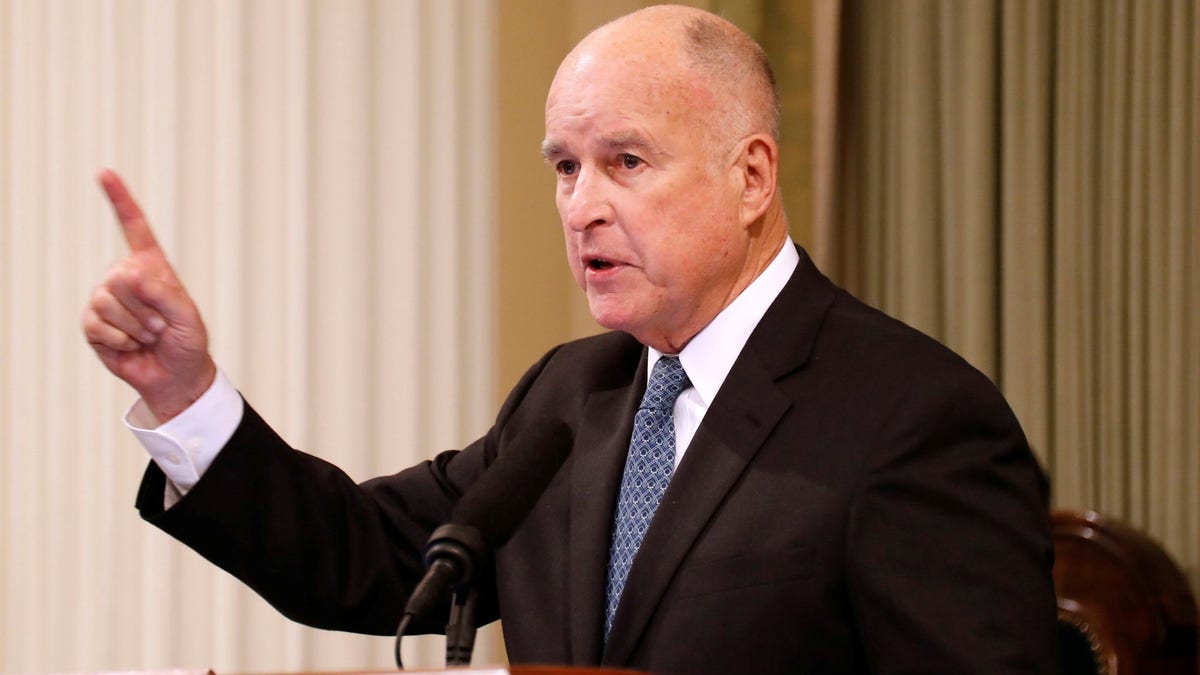
FILE -- California Governor Jerry Brown delivers his final state of the state address in Sacramento, California, U.S., January 25, 2018. (REUTERS/Fred Greave)
Don’t expect California Gov. Jerry Brown to roll out the red carpet for President Trump when the president is scheduled to visit the Golden State in the week ahead.
A raised middle finger is a more likely greeting, after U.S. Attorney General Jeff Sessions slapped a lawsuit on Brown and his “resistance” henchman, California Attorney General Xavier Becerra, over their “sanctuary state” defiance of federal immigration laws.
The president is scheduled to head to the Otay Mesa border crossing near San Diego to take a look at the prototypes of the new border wall that was one of his most prominent campaign promises. He’s certainly determined to “Build the Wall” – and rightly so.
It seems bizarre to me that the idea of protecting your national border is even mildly controversial. It certainly isn’t in any other country I’m aware of. Quite the opposite, it’s seen as a basic expectation of government.
And as the New York Times recently – and perhaps unwittingly – showed, there are huge sections of America’s border with Mexico that are effectively unprotected, whether by a man-made barrier or a natural one.
Just scroll down to the “Short Fencing” section in this interactive map to see the vast gaps that exist. Who knew that the New York Times would end up producing one of the most persuasive arguments for President Trump’s wall?
But the question I have for Jerry Brown, after reflecting on this week’s back-and-forth with Sessions is this:
Gov. Brown, will you build a wall? Not between California and Mexico, of course – your extreme open borders ideology won’t let you do that (or perhaps more accurately, your weak pandering to the open borders extremists in your party’s base won’t let you do that). But will you build a wall between California and Oregon, Nevada, and Arizona? That is the only logical consequence of the position you have staked out.
Brown’s argument is that California has every right to determine its own policy on immigration, and a responsibility to protect the large community of illegal immigrants living in the state.
Let’s acknowledge something at the outset: Of course it’s true that the majority of those illegal immigrants are otherwise law-abiding and hardworking members of their local communities who make a positive contribution to California’s economy and society.
Let’s also agree that anyone who believes in the decentralization of power and the rights (enshrined in the Constitution) for states to determine their own affairs should instinctively support California’s wish to treat people living in the state however its elected leaders choose.
But here we come up against another the practical problem: If California has the right to protect illegal immigrants (including those with criminal convictions), then by the same token, any other state has the right not to do that.
Let’s take Arizona as an example – a state that borders California. The attitudes of elected leaders in Arizona on immigration are vastly different than California’s elected officials. Arizonans, through their elections, have said they don’t want illegal immigrants in their state. They especially don’t want illegal immigrants who also happen to be violent criminals.
Can Brown guarantee that not a single one of the illegal immigrants protected by his sanctuary policies will ever end up in Arizona? Or any other state? Of course not. The only way he could do that would be to “Build the Wall” – between California and its neighboring states. Of course that’s not going to happen.
It is for these very obvious practical reasons that the Supreme Court has repeatedly ruled that immigration policy is one area that should clearly be subject to overall federal control. You can’t have 50 immigration policies in a country with no internal borders.
That argument applies, by the way, to all illegal immigrants, including the majority who are otherwise law-abiding. But doesn’t it apply even more when we consider the minority of illegal immigrants who are violent criminals?
It is absolutely astonishing to me that in order to make a political point, California’s elected Democrats – from the governor, to the mayor of Oakland, to the leading Democratic candidates to be elected the next governor this November – are literally prepared to release convicted child sex offenders, drug dealers and other violent criminals on to the streets.
As a resident of the Bay Area, this affects me personally. It offends me personally.
That’s why I want so much to talk to Gov. Brown about it. We’ve asked him to join us on “The Next Revolution” this Sunday. He described the Trump administration last week as behaving “like Fox News.” The least he could do is explain what he meant to this particular Fox News Channel host, who is directly affected by his dangerous sanctuary state posturing.
The governor’s office said he’s “unavailable.” Well, isn’t that a surprise? Earlier in the week on Fox News, I said that California’s Democrats “have moved so far to the left on immigration that they’re halfway to Hawaii.”
Perhaps Gov. Brown is embarrassed about where he’s ended up on this issue. Perhaps he just lives in a bubble and can’t cope with any challenge to his views. Either way, the invitation still stands: Jerry Brown, please, will you talk to me?
With or without Gov. Brown, we’ll debate all this on “The Next Revolution” this Sunday at 9 p.m. on Fox News Channel – hope you can join us!




















